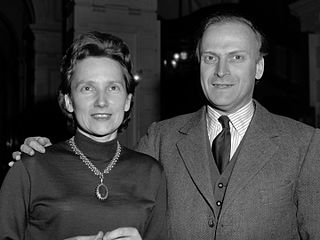A Quote by Hephzibah Menuhin
Related Quotes
What I would like to give my daughter is freedom. And this is something that must be given by example, not exhortation. Freedom is a loose leash, license to be different from your mother and still be loved...Freedom is...not insisting that your daughter share your limitations. Freedom also means letting your daughter reject you when she needs to and come back when she needs to. Freedom is unconditional love.
Leibniz believed in freedom, both divine and human, and he thought that contingency was a necessary condition of freedom. That is, if an agent A acts freely when choosing X, then A's choosing X cannot be necessary. But there are some elements in his philosophy that seem to make contingency impossible.
'Freedom' means a lot to conservatives, but they have such a narrow sense of what it means. They think a lot about freedom from - freedom from government, freedom from regulation - and precious little about freedom to. Freedom to is absolutely something that has to be safeguarded by good government, just as it could be impaired by bad government.
Knowledge is a burden if it robs you of innocence. Knowledge is a burden if it is not integrated into life. Knowledge is a burden if it doesn't bring joy. Knowledge is a burden if it gives you an idea that you are wise. Knowledge is a burden if it doesn't set you free. Knowledge is a burden if it makes you feel you are special.
Isn't that how it is when you must decide with your heart? You are not just choosing one thing over another. You are choosing what you want. And you are also choosing what somebody else does not want, and all the consequences that follow. You can tell yourself, That's not my problem, but those words do not wash the trouble away. Maybe it is no longer a problem in your life. But it is always a problem in your heart.




































